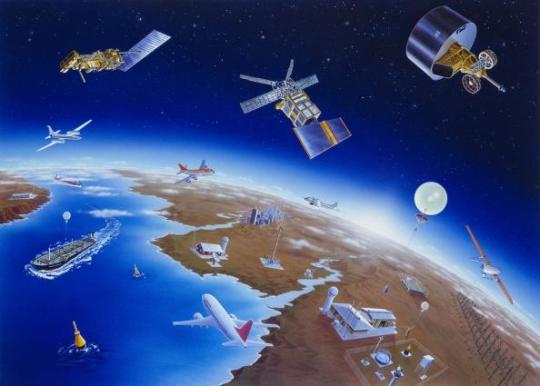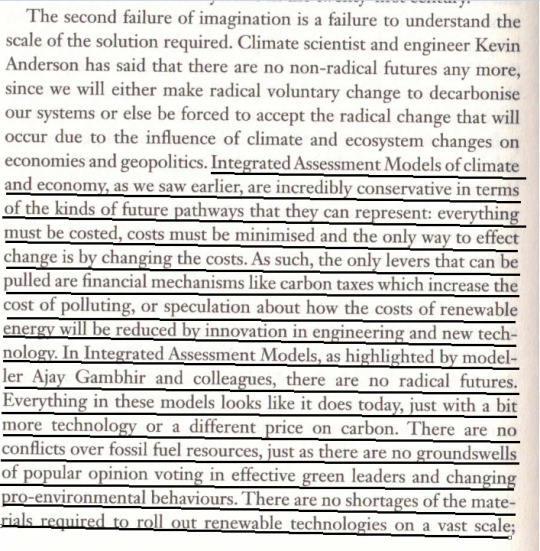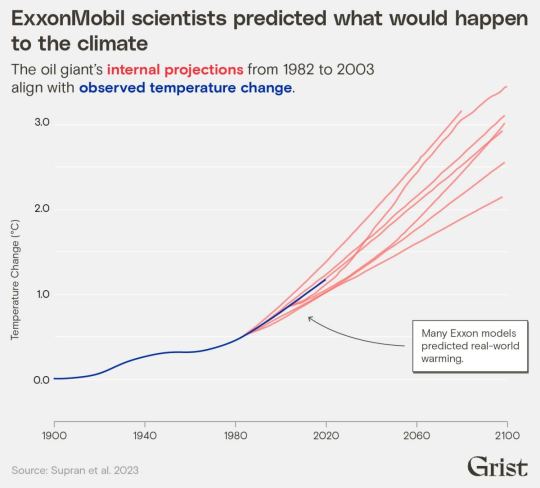#climate model
Text
17 notes
·
View notes
Text
The advance in the understanding of the Earth’s complex global weather and climate system.

Remarkable new observation and modelling technologies continue to develop, helping advance understanding of the Earth’s complex global weather and climate system. As a result, today’s five-day forecasts are as reliable as the two-day forecast of 25 years ago. These advances translate into literally billions of dollars in economic gains.
#Climate observations#weather#climate model#Climate weather#climate system#WMOat150#history#150th anniversary#world meteorological organization#21th century
0 notes
Text
Determined to use her skills to fight inequality, South African computer scientist Raesetje Sefala set to work to build algorithms flagging poverty hotspots - developing datasets she hopes will help target aid, new housing, or clinics.
From crop analysis to medical diagnostics, artificial intelligence (AI) is already used in essential tasks worldwide, but Sefala and a growing number of fellow African developers are pioneering it to tackle their continent's particular challenges.
Local knowledge is vital for designing AI-driven solutions that work, Sefala said.
"If you don't have people with diverse experiences doing the research, it's easy to interpret the data in ways that will marginalise others," the 26-year old said from her home in Johannesburg.
Africa is the world's youngest and fastest-growing continent, and tech experts say young, home-grown AI developers have a vital role to play in designing applications to address local problems.
"For Africa to get out of poverty, it will take innovation and this can be revolutionary, because it's Africans doing things for Africa on their own," said Cina Lawson, Togo's minister of digital economy and transformation.
"We need to use cutting-edge solutions to our problems, because you don't solve problems in 2022 using methods of 20 years ago," Lawson told the Thomson Reuters Foundation in a video interview from the West African country.
Digital rights groups warn about AI's use in surveillance and the risk of discrimination, but Sefala said it can also be used to "serve the people behind the data points". ...
'Delivering Health'
As COVID-19 spread around the world in early 2020, government officials in Togo realized urgent action was needed to support informal workers who account for about 80% of the country's workforce, Lawson said.
"If you decide that everybody stays home, it means that this particular person isn't going to eat that day, it's as simple as that," she said.
In 10 days, the government built a mobile payment platform - called Novissi - to distribute cash to the vulnerable.
The government paired up with Innovations for Poverty Action (IPA) think tank and the University of California, Berkeley, to build a poverty map of Togo using satellite imagery.
Using algorithms with the support of GiveDirectly, a nonprofit that uses AI to distribute cash transfers, the recipients earning less than $1.25 per day and living in the poorest districts were identified for a direct cash transfer.
"We texted them saying if you need financial help, please register," Lawson said, adding that beneficiaries' consent and data privacy had been prioritized.
The entire program reached 920,000 beneficiaries in need.
"Machine learning has the advantage of reaching so many people in a very short time and delivering help when people need it most," said Caroline Teti, a Kenya-based GiveDirectly director.
'Zero Representation'
Aiming to boost discussion about AI in Africa, computer scientists Benjamin Rosman and Ulrich Paquet co-founded the Deep Learning Indaba - a week-long gathering that started in South Africa - together with other colleagues in 2017.
"You used to get to the top AI conferences and there was zero representation from Africa, both in terms of papers and people, so we're all about finding cost effective ways to build a community," Paquet said in a video call.
In 2019, 27 smaller Indabas - called IndabaX - were rolled out across the continent, with some events hosting as many as 300 participants.
One of these offshoots was IndabaX Uganda, where founder Bruno Ssekiwere said participants shared information on using AI for social issues such as improving agriculture and treating malaria.
Another outcome from the South African Indaba was Masakhane - an organization that uses open-source, machine learning to translate African languages not typically found in online programs such as Google Translate.
On their site, the founders speak about the South African philosophy of "Ubuntu" - a term generally meaning "humanity" - as part of their organization's values.
"This philosophy calls for collaboration and participation and community," reads their site, a philosophy that Ssekiwere, Paquet, and Rosman said has now become the driving value for AI research in Africa.
Inclusion
Now that Sefala has built a dataset of South Africa's suburbs and townships, she plans to collaborate with domain experts and communities to refine it, deepen inequality research and improve the algorithms.
"Making datasets easily available opens the door for new mechanisms and techniques for policy-making around desegregation, housing, and access to economic opportunity," she said.
African AI leaders say building more complete datasets will also help tackle biases baked into algorithms.
"Imagine rolling out Novissi in Benin, Burkina Faso, Ghana, Ivory Coast ... then the algorithm will be trained with understanding poverty in West Africa," Lawson said.
"If there are ever ways to fight bias in tech, it's by increasing diverse datasets ... we need to contribute more," she said.
But contributing more will require increased funding for African projects and wider access to computer science education and technology in general, Sefala said.
Despite such obstacles, Lawson said "technology will be Africa's savior".
"Let's use what is cutting edge and apply it straight away or as a continent we will never get out of poverty," she said. "It's really as simple as that."
-via Good Good Good, February 16, 2022
#older news but still relevant and ongoing#africa#south africa#togo#uganda#covid#ai#artificial intelligence#pro ai#at least in some specific cases lol#the thing is that AI has TREMENDOUS potential to help humanity#particularly in medical tech and climate modeling#which is already starting to be realized#but companies keep pouring a ton of time and money into stealing from artists and shit instead#inequality#technology#good news#hope
201 notes
·
View notes
Text


Erica Thompson, Escape from Model Land: How Mathematical Models Can Lead Us Astray and What We Can Do About It (2022)
#see also how pandemic modelling completely failed to account for social behaviour#climate change#mathematics#climate modelling#science#global warming#erica thompson#escape from model land#economics
199 notes
·
View notes
Photo

Exxon’s models predicting climate change were spot on — 40 years ago
A new study finds that Exxon’s projections were as good as any academic's
At the beginning of the 1980s, Exxon’s own scientists had warned that continuing to burn fossil fuels would lead to “catastrophic” and “irreversible” consequences. But starting in 1989, Exxon publicly dismissed its own findings. The company’s leadership cast doubt on the credibility of climate science, deriding models and emphasizing how “uncertainty” made them virtually useless. It’s part of a larger story about how many companies — including Shell, coal companies, and utilities — misled the public about climate change while their executives understood and downplayed the dangers of skyrocketing carbon emissions.
These criminals should be in jail.
149 notes
·
View notes
Text

every tim e i think of kuya's evil face it's just

#that's his character model now. see sheet K: smug cat#god what i would give for a weighted blanket giant snakumo in the summer#THAT CRISPY COOL SNAKE SKIN *grabby hands*#i need to be crushed by an ice block. just smush me. primitive cryogenics only#absolutely catch me in the summer grabbing the limbs of all my friends who grew up in hot climates#they have the power of adaptation. their temperatures are cool. sustainable.#i do not have such power. i am on fire all the time#the tags tho#hi The Req!! where was i going with this. idk. i just wanted to say hi 😎#kuya#yakumo
26 notes
·
View notes
Text
“the locked tomb is about love vs. freedom” “the locked tomb is about death” “the locked tomb is about the dangers of codependent relationships” “the locked tomb is about climate change” “the locked tomb is about identity with regards to the soul” yeah sure but above all else. the locked tomb is about bodily autonomy
#idk just thinking about alecto and the parallel tamsyn muir draws between fighting climate change#and the body autonomy fight of the feminist movement#the patriarchal control and harm john exerts on the earth in a paternal patronizing attempt to save it#the byproduct of john eating the earth being an eve-like creation of alecto in the model of the pinnacle of white femininity#the way that necromancers keep their body when becoming lyctors except for their cavaliers’ eyes and consumed soul#the difference between ianthe fucking with harrow’s hair glands vs. harrow growing ianthe a new arm#the resistance’s plan to take down john being contingent on nonconsensual sex. wake despising carrying gideon for nine months.#the creation of paul being implied to create a new body#nona being able to read all body language and understanding people best through how they physically are#john making kiriona’s body ‘perfect’ by making it impenetrable (untouchable) and heartless#harrow puppeting her dead parents’ bodies for years. john raising ulysses and titania as dead puppets as his first act of necromancy#nona being able to speak with varun and empathize with his grief and anger#idk. bodies and planets and personhood and the violation of all#the locked tomb#blah.txt
52 notes
·
View notes
Photo

#alexis ren#Alexis René Glabach#social media personality#climate activist#model#youtuber#alexis#entrepreneur
27 notes
·
View notes
Text

#Vogue#Vogue Taiwan#Dedicated to the Environment#climate change#climate crisis#2022#vogue 2022#Peng Chang#heat wave#fashion#model#editorial#fashion photography#mermaid#little mermaid#the little mermaid#sustainability
5 notes
·
View notes
Text


botter photographed by ruth ossai
#fashion#editorials#botter#avant garde#diy#plastic#styling#french#paris#pfw#caribbean#ruth ossai#photography#beauty#model#editorial#pink#floaty#climate change#island
2 notes
·
View notes
Text
#attapoll app#attapoll#makemoney#marketing#paidsurveys#motorcycle#notes#natural hair#model off duty#mp100#ACLA23#YouTube#climate leaders#climate solutions#climate action#climate and environment#climate#climate and health#climate blog#climate change#climate activism#climate justice#climate news#weather and climate#environmental news#environment#environmental awareness#environmental activism#environmental justice#environmental
7 notes
·
View notes
Text
AI Algorithm Improves Predictive Models of Complex Dynamical Systems - Technology Org
New Post has been published on https://thedigitalinsider.com/ai-algorithm-improves-predictive-models-of-complex-dynamical-systems-technology-org/
AI Algorithm Improves Predictive Models of Complex Dynamical Systems - Technology Org
Researchers at the University of Toronto have made a significant step towards enabling reliable predictions of complex dynamical systems when there are many uncertainties in the available data or missing information.
Artificial intelligence – artistic concept. Image credit: geralt via Pixabay, free license
In a recent paper published in Nature, Prasanth B. Nair, a professor at the U of T Institute of Aerospace Studies (UTIAS) in the Faculty of Applied Science & Engineering, and UTIAS PhD candidate Kevin Course introduced a new machine learning algorithm that surmounts the real-world challenge of imperfect knowledge about system dynamics.
The computer-based mathematical modelling approach is used for problem solving and better decision making in complex systems, where many components interact with each other.
The researchers say the work could have numerous applications ranging from predicting the performance of aircraft engines to forecasting changes in global climate or the spread of viruses.
From left to right: Professor Prasanth Nair and PhD student Kevin Course are the authors of a new paper in Nature that introduces a new machine learning algorithm that addresses the challenge of imperfect knowledge about system dynamics. Image credit: University of Toronto
“For the first time, we are able to apply state estimation to problems where we don’t know the governing equations, or the governing equations have a lot of missing terms,” says Course, who is the paper’s first author.
“In contrast to standard techniques, which usually require a state estimate to infer the governing equations and vice-versa, our method learns the missing terms in the mathematical model and a state estimate simultaneously.”
State estimation, also known as data assimilation, refers to the process of combining observational data with computer models to estimate the current state of a system. Traditionally, it requires strong assumptions about the type of uncertainties that exist in a mathematical model.
“For example, let’s say you have constructed a computer model that predicts the weather and at the same time, you have access to real-time data from weather stations providing actual temperature readings,” says Nair. “Due to the model’s inherent limitations and simplifications – which is often unavoidable when dealing with complex real-world systems – the model predictions may not match the actual observed temperature you are seeing.
“State estimation combines the model’s prediction with the actual observations to provide a corrected or better-calibrated estimate of the current temperature. It effectively assimilates the data into the model to correct its state.”
However, it has been previously difficult to estimate the underlying state of complex dynamical systems in situations where the governing equations are completely or partially unknown. The new algorithm provides a rigorous statistical framework to address this long-standing problem.
“This problem is akin to deciphering the ‘laws’ that a system obeys without having explicit knowledge about them,” says Nair, whose research group is developing algorithms for mathematical modelling of systems and phenomena that are encountered in various areas of engineering and science.
A byproduct of Course and Nair’s algorithm is that it also helps to characterize missing terms or even the entirety of the governing equations, which determine how the values of unknown variables change when one or more of the known variables change.
The main innovation underpinning the work is a reparametrization trick for stochastic variational inference with Markov Gaussian processes that enables an approximate Bayesian approach to solve such problems. This new development allows researchers to deduce the equations that govern the dynamics of complex systems and arrive at a state estimate using indirect and “noisy” measurements.
“Our approach is computationally attractive since it leverages stochastic – that is randomly determined – approximations that can be efficiently computed in parallel and, in addition, it does not rely on computationally expensive forward solvers in training,” says Course.
While Course and Nair approached their research from a theoretical viewpoint, they were able to demonstrate practical impact by applying their algorithm to problems ranging from modelling fluid flow to predicting the motion of black holes.
“Our work is relevant to several branches of sciences, engineering and finance as researchers from these fields often interact with systems where first-principles models are difficult to construct or existing models are insufficient to explain system behaviour,” says Nair.
“We believe this work will open the door for practitioners in these fields to better intuit the systems they study,” adds Course. “Even in situations where high-fidelity mathematical models are available, this work can be used for probabilistic model calibration and to discover missing physics in existing models.
“We have also been able to successfully use our approach to efficiently train neural stochastic differential equations, which is a type of machine learning model that has shown promising performance for time-series datasets.”
While the paper primarily addresses challenges in state estimation and governing equation discovery, the researchers say it provides a general groundwork for robust data-driven techniques in computational science and engineering.
“As an example, our research group is currently using this framework to construct probabilistic reduced-order models of complex systems. We hope to expedite decision-making processes integral to the optimal design, operation and control of real-world systems,” says Nair.
“Additionally, we are also studying how the inference methods stemming from our research may offer deeper statistical insights into stochastic differential equation-based generative models that are now widely used in many artificial intelligence applications.”
Source: University of Toronto
You can offer your link to a page which is relevant to the topic of this post.
#A.I. & Neural Networks news#aerospace#ai#aircraft#algorithm#Algorithms#amp#applications#approach#artificial#Artificial Intelligence#artificial intelligence (AI)#Black holes#challenge#Chemistry & materials science news#Classical physics news#climate#computational science#computer#computer models#course#data#data-driven#datasets#decision making#Design#development#dynamic systems#dynamics#engineering
2 notes
·
View notes
Text
That pesky reality. “Climate change is fundamentally different to other shocks because once it has hit, it doesn't go away," said Thierry Philipponnat, author of a report by Finance Watch, a Brussels-based public interest NGO on financial issues. “And if the fundamental assumption is flawed, all the rest makes little sense - if any.”
2 notes
·
View notes
Text
complete opposite vibe as the last post but it still is really sad to me that she hasn’t (at least at this point) made any efforts to offset her tour's carbon footprint even though i didn't have high expectations that she would
#i like get bc looking at coldplay there's no way she could do it fully without paying for some out of pocket#the industry and the nature of what tour entails just isn't built on a sustainable model#but there are still ways to prevent and mitigate#ugh#lmao like once a month i need a day to acknowledge and mourn that my fave is like a hugely significant contributor to the climate crisis#nevertheless she persisted 🦈🥸🐁💀 with swiftieism#vi is typing...#lmao just rereard these tags and they make no sense i was leaving out words left and right#whatever u get what i meant
10 notes
·
View notes
Text
We go offline for a few days to figure out knitting and awaken to find there's a genocide going on. Cool. We love the state of world events in the year 2023.
#we speak#this is a vague complaint post#the preamble to this may have started earlier but we do not follow social justice blogs on purpose#and the tumblr posts we DO see are largely whatever turns up from sifting through the handful of People We Followed Back#goddammit. we are going to have to look through news networks to get Actual News now#we do not trust tumblr dot com to be a primary source of information in any way#especially not when the social justice scene on this website is overly prone to turning to cult tactics#if you are reading this post then you desperately need to research the BITE model btw#judging by the timeframe things started Going Wrong we are 50% sure this is a monkey's paw wish or something#you will gain enough autonomy to not constantly be trapped within the Family Cheese Grater#BUT the state of affairs will rapidly tumble downhill the moment you have the means to be aware of it#not a big fan of this state of affairs#we would really prefer it if we could hunt down people talking about day to day life in the specific climate we're looking for#WITHOUT learning about new atrocities#unfortunately it appears that the atrocities are happening regardless
4 notes
·
View notes